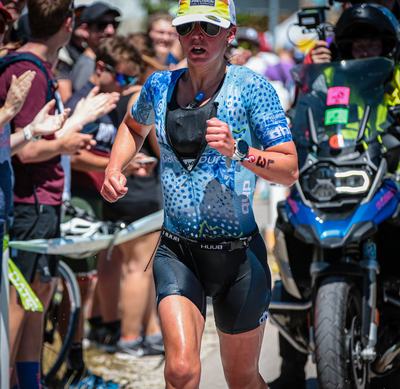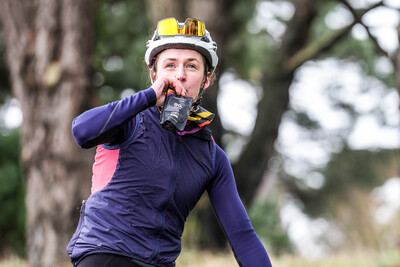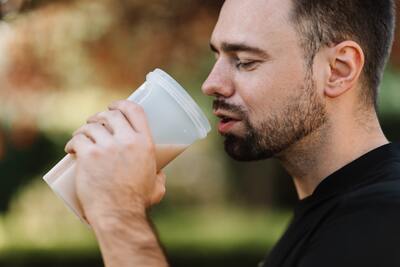What’s your go-to choice of food to aid recovery after exercise? Many endurance athletes are quick to reach for the protein shake above all else and for good reason. A strong body of science (as well as some clever marketing) supports the use of protein as part of an effective recovery strategy.
After all, protein can help repair damaged muscles and maximise training adaptations, but is it really the ‘be all and end all’ when it comes to recovery for endurance athletes?
There’s no doubt that an intense training session may cause some muscle damage. But a significant additional cost of training and racing is a dramatic depletion of your energy stores, namely glycogen (the body’s carbohydrate storage molecule), which is why the use of carbohydrates for recovery becomes important.
You should think of glycogen as your main exercise fuel tank, once it’s empty, you (the vehicle) begin to run on fumes until you put more of the correct fuel in.
So, if your training is primarily endurance-based, you should focus on consuming enough fuel - i.e. carbohydrate - during and after exercise to top up your tank…
4 reasons why carbs are important for recovery
Despite anecdotal reports that endurance athletes undergo a significant amount of their training in a low-carb state, this just doesn’t seem to hold true when you speak to athletes, coaches and those ‘in the know’. In fact, serious athletes are striving to maximise their carbohydrate intake in their training, racing and recovery.

This is because underfueling by failing to take in enough carbohydrate is a sure-fire way of inducing fatigue, both mental and physical. When exercising at high-intensities, your body can burn through the majority of its glycogen stores within ~60-90 minutes, which can be easily done if you’re racing or undertaking a tough training session.
So, including appropriate levels of carbohydrate in your recovery meal increases your blood glucose concentration which, in turn, increases your blood insulin levels. The hormone insulin plays a key role in maintaining homeostasis, a steady state in the body, and is responsible for bringing blood glucose levels back to normal. It does this by telling the cells to grant access to the glucose that’s circulating in the blood. Once inside, the liver and muscles then convert glucose into glycogen and restock your body’s energy reserves.
This restoration of glycogen is important to your recovery for several reasons:
1. Firstly, carbs help support tough sessions
If you’re not adequately refueling then you may be compromising your adaptations to training. In order to reap all of the benefits of training, your body needs you to provide it with the resources it needs during the recovery period.
2. Carbs support subsequent training
Refueling becomes especially important when you intend to race or train again shortly after your first exercise bout. Failing to restore your glycogen levels by not eating an appropriate amount of carbohydrate lowers your ability to produce your best during an upcoming session.
Referring back to the fuel tank analogy: if you’ve emptied the tank, then it’s vital that you refill it before trying to step on the gas for a second time. If you don’t refuel adequately, you risk bonking and being left stranded on the side of the road…
3. Carbs reduce the risk of illness and injury
As an endurance athlete, your immune system can be susceptible around periods of exhaustive exercise, and more so if you fail to adequately refuel (and rehydrate). Not consuming enough carbohydrates, or calories in general, adds greater strain to your body and longer term underfueling can increase your risk of stress fractures and other injuries.

4. Carbs help sleep quality
The importance of carbohydrate to sleep stems from glucose being the brain’s main, and preferred, source of energy. While we sleep overnight, the brain relies on the liver to maintain blood glucose levels and supply it with much needed carbohydrate. By morning, our liver glycogen stores can be depleted significantly.
Precision Fuel & Hydration founder, Andy Blow, recalls how under-eating during periods of heavy training would result in poor sleep quality when he was training full-time as a triathlete.
“When I was routinely training twice a day it was not uncommon for me to have to get up around 11.30pm to eat a bowl of cereal in order to get back to sleep. If I was under-fueled, it often impaired my ability to get to or stay asleep.”
By going to bed with low energy stores, you can affect your sleep quality by predisposing yourself to very low blood glucose levels overnight (entering a hypoglycemic state). This point may be particularly relevant if you complete some of your toughest training sessions late in the evening and then struggle to, or don’t like to, eat much before bed.
Sleep is when the body truly rests and repairs itself, so compromising your sleep quality can have big consequences on your overall recovery.
How to use carbs to optimise your recovery
Refueling requires eating at the right times and eating enough. So, let’s take a look at the optimal timing, amount and type of carbohydrate for recovery…
Timing
Complete muscle glycogen recovery takes up to 18-24 hours if you get seriously depleted. That’s a long time; longer than most athletes with high training volumes have to recover before their next training session. Therefore, when you need to be 100% ready to perform again quickly (e.g. <8 hours since your last exercise bout) and it’s in your best interest to maximise glycogen replenishment, your carbohydrate refueling should be aggressive.
Research has shown that there’s a positive relationship between ingesting carbohydrates quickly and the rate of glycogen restoration in the first few hours following exercise. This is because the muscle is primed at this time by your prior exercise to rapidly uptake glucose.
Therefore, if you intend to train or compete again not too long after one exhaustive bout of training or racing, then the sooner you can eat a carb-rich recovery meal or snack, the more rapidly the muscles can replenish their glycogen.
If circumstances allow, nutritional recovery can even begin DURING training. Excess fuel taken during a session, particularly towards the end, provides fuel for the recovery period. For example, a triathlete might take an energy gel or an energy chew in the final 20 minutes of their bike session to initiate greater recovery for their upcoming run session later that same day.
This is by no means an exhaustive list; you may benefit from a more aggressive approach to carbohydrate intake if you:
- Train two or three times a day
- Compete in heats, semis and finals during a single 24-hour meet (e.g. swimmers)
- Complete in multi-day endurance events and finish late in the evening and begin again in the early hours
In these cases, consider your post-exercise recovery as your pre-exercise preparation!
To further aid recovery, there’s evidence to suggest that the ingestion of caffeine when combined with carbs may also enhance muscle glycogen resynthesis. That’s good news for caffeine lovers!
You may utilise caffeine to enhance muscle glycogen restoration when training twice a day (following your morning session) or if racing or competing multiple times a day. Be aware that caffeine can also detrimentally affect your sleep so timing is crucial. While caffeine can help recovery, you might choose to avoid using it late in the afternoon or evening to avoid spoiling your nights’ sleep.

Caffeine won’t be for everyone though, so before you start adding it to your fueling strategy, it will be worth answering the question: should you be using caffeine?
In contrast to all of the above, when your time to recover between sessions is longer, up to 12-24 hours, then the urgency to refuel is reduced. You definitely have a bit more flexibility to eat when it suits you. Rest assured that, in the time between finishing your exercise and eating something, the body will still be resynthesising glycogen in the muscle; the process is just happening more slowly.
Do note that after ~24 hours of recovery, regardless of when you ate your post-exercise meal or recovery snack (i.e. if you delayed eating by 2-3 hours or ate immediately afterwards), total muscle glycogen will be restored to a similar level (assuming you meet your overall energy needs).
Quantity
Just as timing is important to glycogen recovery when you need to perform again quickly, somewhat predictably, the quantity of carbohydrate you eat is too.
When trying to maximize glycogen storage in the acute recovery period, you should aim to consume between 1-1.2 grams of carbohydrate per kilogram of body weight per hour (0.45-0.55 grams per pound) during the first ~4 hours. This is per the recommendations presented in the most recent American College of Sports Medicine (ACSM) Position Stand which reflects the up-to-date knowledge from the world’s most renowned sports science researchers and practitioners.
For a 70kg/154lb athlete, here are some example recovery meals and snacks to illustrate how you might meet your carbohydrate requirements:
- 250g cooked pasta with tomato sauce
- Medium jacket potato and half a can of baked beans
- Three slices of white bread, 2 tbsp jam or honey and a banana
- A single blueberry muffin or ~100g flapjack
- A recovery shake: ~400ml milk, one serving of a recovery protein powder, and a banana
- 5 scoops of Carb Only Drink Mix
= All ~70g of carbohydrate
When you lay it out in real-world terms, you can see that’s quite a lot of carbohydrate you’re being told to consume.
These guidelines are helpful and should be used as your starting point, but it’s good practice to allow your actual intake to be adjusted according to the duration and intensity of your first bout of exercise.
If the exercise wasn’t particularly long in duration or too great in intensity, then you can afford to dial these numbers down. Likewise, if you’re not training again in a short period after (i.e. you don’t need to facilitate maximum rapid glycogen recovery), then your initial carb intake can also be a little more conservative.
Type
The type of carbohydrate used during recovery seems to have a limited effect on the rate of glycogen resynthesis. Whether it’s glucose-based or a glucose-fructose mixture, it doesn’t seem to make a difference to the rate or overall level of glycogen restoration.
As long as your total intake of carbohydrate is adequate and your overall nutritional goals are met, meals and snacks can be chosen from a variety of foods and fluids according to your personal preferences.
In practice, there are plenty of examples where certain food and drink options may be more convenient than others. For instance, when you’re confined to the poolside for your swim meet, recovery bars or liquid sources of carbohydrates (e.g. a milkshake, sports drink or a carb-rich recovery mix) are much more practical than a jacket potato or helping of rice.
Ultimately, a nutrient-dense carbohydrate-rich recovery meal, which also includes some protein and some fat, is optimal.
Examples of recovery foods
| **Food ** | Portion size | Energy (kcal) | Carbohydrate (g) | Protein (g) |
|---|---|---|---|---|
| Baked potato with skin | Medium, 2-3” diameter | 161 | 36 | 4.3 |
| Enriched penne pasta, boiled | 1 cup | 169 | 33 | 6.2 |
| Enriched wheat bran cereal with raisins | 1 cup | 191 | 46 | 4.5 |
| Whole wheat bread | 1 slice | 81 | 14 | 4 |
| Black beans, canned, drained | 1 cup | 218 | 40 | 14.7 |
| Oatmeal, cooked, plain | 1 cup | 154 | 27 | 6 |
Table edited from Murray & Rosenbloom (2018). Data are from the US Department of Agriculture.
Do you need protein for recovery?
Let’s take a step back from carbohydrate for a moment and emphasise that protein is still an important part of your recovery and a key component of your overall diet. In the recovery period, protein is necessary for muscle protein synthesis.
For most individuals, optimal protein intake in the recovery period is agreed to be between ~0.25-0.3 g/kg bodyweight, with the upper end being more appropriate if you’re looking to increase muscle mass.
On average, this works out as ~20g of protein. For athletes at the extreme ends of the weight spectrum then the guidelines may be adjusted (e.g. rugby players might take up to 0.4g/kg).

Protein is one of the most popular nutritional components amongst athletes, especially those who carry out large amounts of resistance or weight-based training. But, it’s also for athletes whose training is mostly endurance-based.
Instead of only focusing on your protein consumption during recovery, you should consume enough protein spread evenly throughout your day. Unfortunately, the typical Western diet focuses on consuming the majority of daily protein at dinner, with very little at breakfast or lunch.
Carbs and protein for recovery 101
Restoring your glycogen stores by including some carbohydrates in your recovery fueling is essential for optimising recovery, maintaining subsequent performance and staving off fatigue and illness.
The timing, quantity and type of carbohydrates you eat or drink following exercise can all be important, but is most paramount when your intention is to train or race again very quickly and the goal of your second bout is also performance.
Under these circumstances, prioritising your carbohydrate intake in the first four hours is crucial to getting the most out of your second performance.
If you have longer than ~12 hours to recover, then the urgency to rapidly get the carbs in post-exercise is vastly reduced and you can consume your recovery meal as and when you want to. That said, don’t forget that it’s still important to make sure you’re consuming enough.
To rapidly recover glycogen stores, ACSM guidelines state you should aim for between 1.0-1.2g of carbohydrate per kg of bodyweight each hour (0.45-0.55g/lb) in the first ~4 hours following exercise.
Practically, for a 70kg/154lb athlete, this might consist of a larger carb-rich recovery meal in the first 1-2 hours (e.g. pasta with sauce), followed by a recovery milkshake and a sugary sweet treat a little later on.
Protein is also talked about in the recovery process for good reason; it helps repair damage suffered by the muscles and it’s an important component of a healthy, balanced diet. Instead of only being a key focus in the 1-2 hours following exercise, athletes should aim to consume protein moderately across the day, including in each main meal and snacks.
Endurance athletes will benefit from including some protein in their recovery meal but they needn’t go over the top, unless there’s a very strong reason to (e.g. they’re injured or they’re trying to increase muscle mass).
